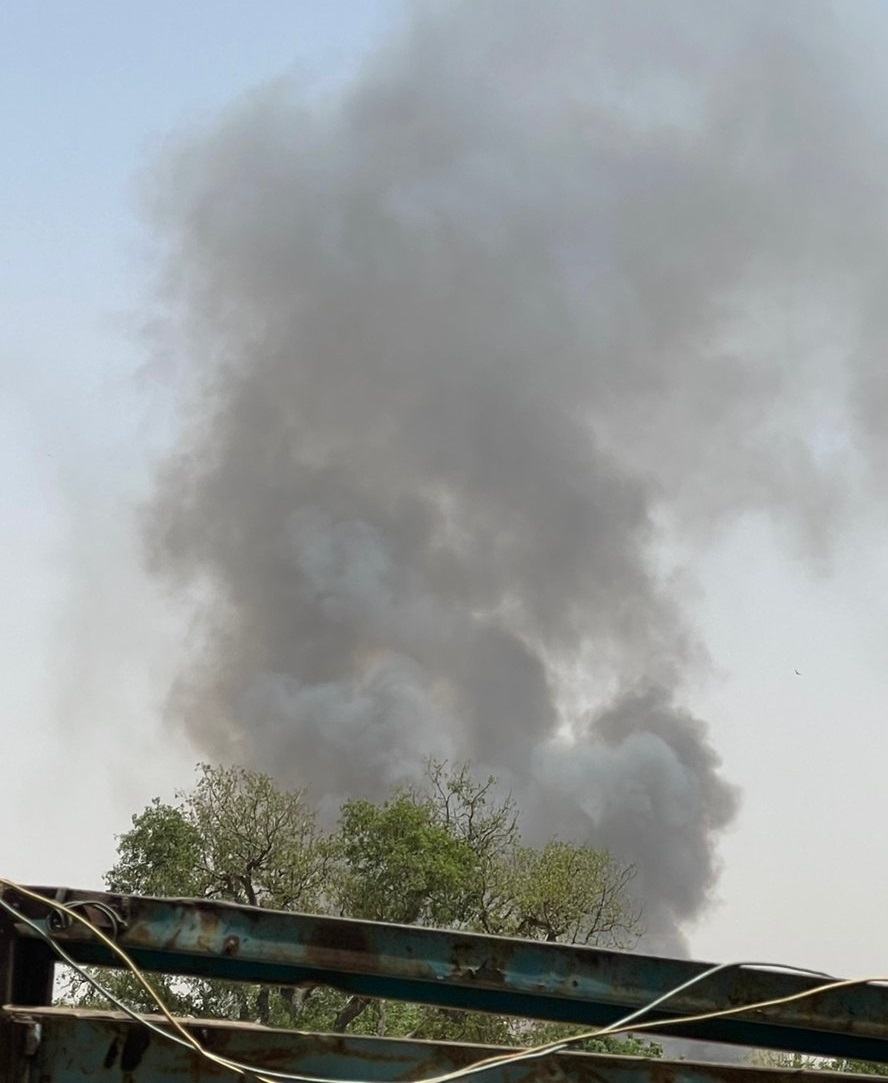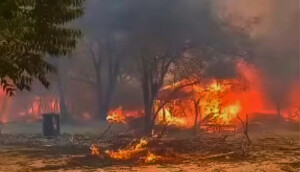West Darfur clashes leave 25 dead, prisoners freed in Nyala, El Fasher, and Ed Daein

Smoke rising nearby the shelter of a War Child employee in El Geneina. He was not evacuated. "This man is currently hiding under his bed and sent over this photo," Yousra Elbagir tweeted (Social media)
EL GENEINA / EL FASHER / NYALA / ED DAEIN –
Battles between the army and Rapid Support Forces (RSF) in El Geneina on Monday reportedly killed 25 people, while clashes turned tribal on Tuesday, leaving scores dead and injured. More than 600 prisoners were released from Shala Prison in North Darfur due to a lack of food and water, while authorities in East and South Darfur released inmates for the same reasons.
The Darfur Bar Association reported that 25 people were killed during battles between the army and the RSF in El Geneina on Monday.
Sultan Saad Bahreldin, the sultan of the Masalit tribe, told Radio Dabanga that gunmen launched attacks on El Geneina on Tuesday morning, amid the complete absence of army forces, the police, and the RSF. The attacks left an unknown number of people dead and injured.. Thousands of people fled to other parts of the city or to neighbouring Chad.
A committee was formed to defuse the crisis and almost reached a consensus between the warring parties, the sultan explained.
Sheikh Abdallah Daoud, one of the displaced people, told Radio Dabanga that the fighting began with clashes between the army and the RSF. “Gunmen in Land Cruisers and on motorcycles joined the fighting, which resulted in parts of shelters close to the El Jebel neighbourhood being burned”.
The attacks continued in the eastern neighbourhoods on Tuesday, and explosions were heard near the market, he said.
The governor of West Darfur, Khamees Abdallah, expressed his regret about the violence in the state in a press statement yesterday. He affirmed his full support for all community peace initiatives and full solidarity with the Together for Stability in West Darfur Initiative.
Prison releases
In El Fasher, the North Darfur Prisons Administration announced the release of 630 prisoners from Shala prison, including 10 minors and five women, while those sentenced to death were retained.
In South Darfur, the authorities released the inmates of the large Nyala Prison due to the lack of food, drinking water and electricity.
Witnesses from the prison’s neighbours told Radio Dabanga that they have been hearing the complaints of inmates throughout the past days, and the sound of heavy gunfire to scare them. Eyewitnesses said that some of the prisoners cried with joy at their release.
The inmates of Ed Daein Prison in East Darfur have been released by the authorities as well.
Last week, thousands of prisoners were freed after men wearing Rapid Support Forces (RSF) uniforms launched attacks on several prisons in the three cities of Khartoum.
Ceasefire holds
North Darfur governor, Nimr Abdelrahman, formed a committee for the protection and security of El Fasher neighbourhoods on Monday. The governor directed the committee to protect the city’s neighbourhoods from thieves and outlaws, and to link them directly with the police.
According to Radio Dabanga’s correspondent, the army and the RSF have adhered to the ceasefire, which was agreed upon with the mediation of the Good Offices Committee last Thursday.
However, she pointed to instances of armed robberies inside El Fasher, which led to the death of three people on Monday and of one policeman on Tuesday morning.
“Work resumed in all hospitals and health centres in the southern part of the city, the dialysis centre and the Abdelsalam Centre, thanks to locals’ efforts” she added.
Situation in Nyala
The Sudanese Red Crescent Society – South Darfur branch announced that its members collected eight bodies of those killed in the confrontations between army and RSF troops in Nyala last week.
A listener told Radio Dabanga from Nyala that “the corpses that were removed were decomposing because they had been left for days in the open”.
People in the South Darfur capital cautiously returned to the city market, with a sense of anticipation tempered by fear of renewed clashes.
The source further reported a significant rise in the prices of basic commodities. “A gallon of fuel now costs SDG 19,000, while a single piece of bread costs SDG 100, and the prices of meat and sugar also increased”.
While food commodities are available in the market, many people are not able to buy them because of the lack of money. Banks and government institutions remain closed.











 and then
and then